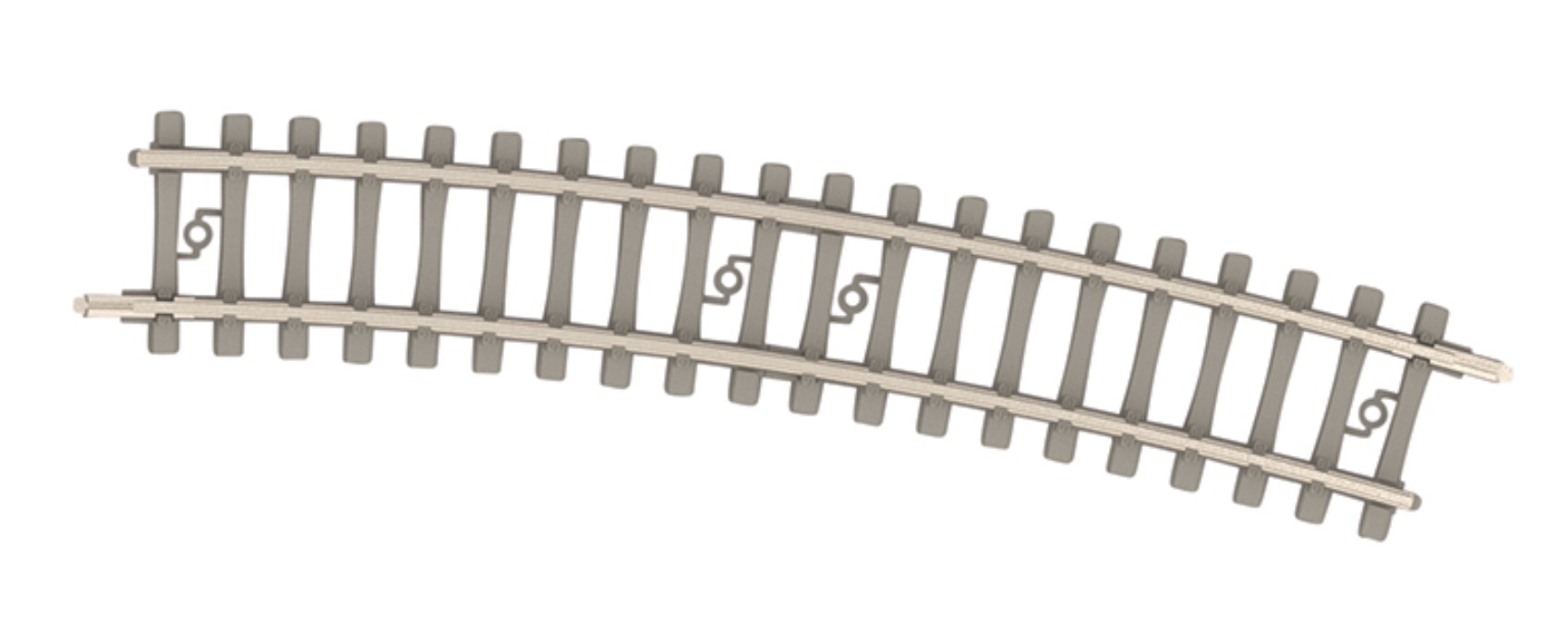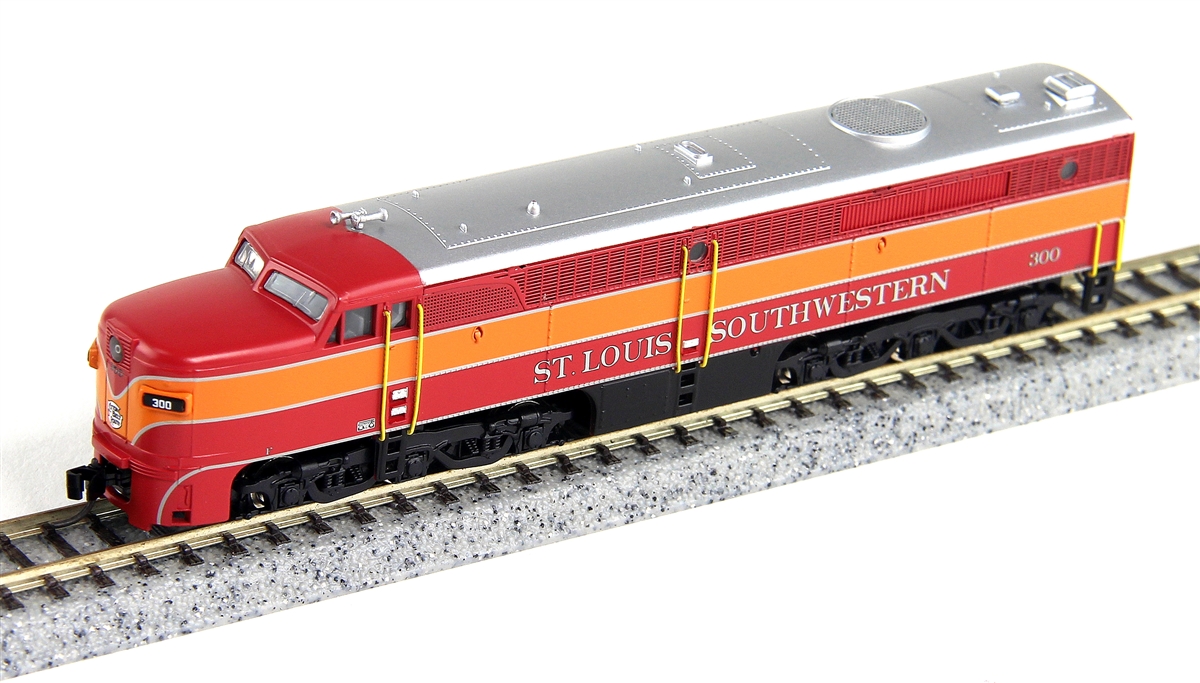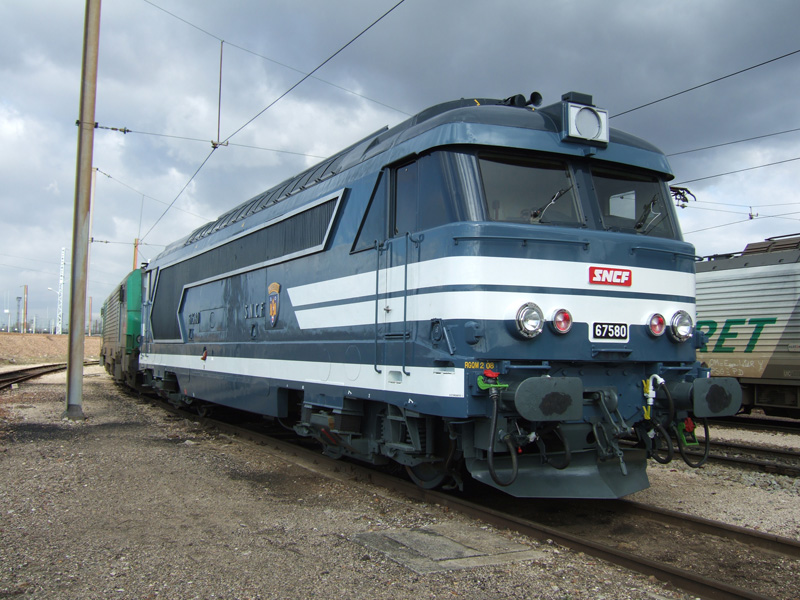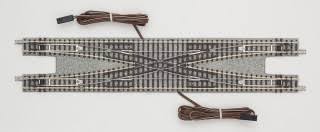Specific Item Information: Available only in pack of 10.
Road Name History:  Can't have model trains without track can we? The track on a railway or railroad, also known as the permanent way, is the structure consisting of the rails, fasteners, railroad ties (sleepers, British English) and ballast (or slab track), plus the underlying subgrade. It enables trains to move by providing a dependable surface for their wheels to roll upon. For clarity it is often referred to as railway track (British English and UIC terminology) or railroad track (predominantly in the United States). Tracks where electric trains or electric trams run are equipped with an electrification system such as an overhead electrical power line or an additional electrified rail.
Text and Images From Wikipedia
Can't have model trains without track can we? The track on a railway or railroad, also known as the permanent way, is the structure consisting of the rails, fasteners, railroad ties (sleepers, British English) and ballast (or slab track), plus the underlying subgrade. It enables trains to move by providing a dependable surface for their wheels to roll upon. For clarity it is often referred to as railway track (British English and UIC terminology) or railroad track (predominantly in the United States). Tracks where electric trains or electric trams run are equipped with an electrification system such as an overhead electrical power line or an additional electrified rail.
Text and Images From Wikipedia
Rail codes:
The code refers to the actual height of the rail. The followings heights are used for N-scale:
- Code 80 = 0.080" tall or about 13" N scale height - the mostly used for sectional tracks.
- Code 70 = 0.070" tall or about 11" N scale height
- Code 55 = 0.055" tall or about 9" N scale height - the mostly used by modelers wishing a realistic effect for their layout. Can be used with all modern rolling stock (low flange wheels).
- Code 40 = 0.040" tall or about 6" N scale height
Turnout codes:
The turnout number describes the length needed for the diverging track to be 1 foot apart from the straight one . So the lower the number, the sharper the curve, and the higher the number, the more gradual curve on the diverging track.
- In a #4 turnout, the rails are 1 foot apart at a distance 4 feet beyond the frog
- In a #6 turnout, the rails are 1 foot apart at a distance 6 feet beyond the frog
- In a #8 turnout, the rails are 1 foot apart at a distance 8 feet beyond the frog
Note that European brands such as Minitrix or Fleischmann use a different notation for turnouts and refer to the radius of the curvature of the diverging track.

Rail codes:
The code refers to the actual height of the rail. The followings heights are used for N-scale:
- Code 80 = 0.080" tall or about 13" N scale height - the mostly used for sectional tracks.
- Code 70 = 0.070" tall or about 11" N scale height
- Code 55 = 0.055" tall or about 9" N scale height - the mostly used by modelers wishing a realistic effect for their layout. Can be used with all modern rolling stock (low flange wheels).
- Code 40 = 0.040" tall or about 6" N scale height
Turnout codes:
The turnout number describes the length needed for the diverging track to be 1 foot apart from the straight one . So the lower the number, the sharper the curve, and the higher the number, the more gradual curve on the diverging track.
- In a #4 turnout, the rails are 1 foot apart at a distance 4 feet beyond the frog
- In a #6 turnout, the rails are 1 foot apart at a distance 6 feet beyond the frog
- In a #8 turnout, the rails are 1 foot apart at a distance 8 feet beyond the frog
Note that European brands such as Minitrix or Fleischmann use a different notation for turnouts and refer to the radius of the curvature of the diverging track.
Brand/Importer Information: Trix is a German company that originally made Trix metal construction sets. one of its co-founders was Stephan Bing, the son of the pioneer toy-maker industrialist Ignaz Bing. In 1935 the company began producing the electrically powered model trains that it became famous for, under the Trix Express label. Prior to the outbreak of World War II the Trix company produced a small range of fairly unrealistic AC powered three rail models running at 14 volts.
N gauge models under the Minitrix brand were made from the late 1960s mostly of European prototypes (German and British primarily). North American prototypes were also manufactured and marketed under the Aurora "Postage Stamp" brand; later these items were sold under the American Tortoise, Model Power and Con-Cor brands. Trix sometimes utilized North American consultants to aid in the design of this portion of the product line. The "Hornby Minitrix' brand was used in the 1980s for a short lived range of British outline models using the earlier product tooling.
Trix's owner in the 1980s and 1990s was Mangold, which went bankrupt in the late 1990s and Märklin purchased the assets in January 1997. In part, this purchase was a reflection of Märklin's need for added production capacity; Trix had been manufacturing certain items for Märklin in previous years. The purchase was also in response to the earlier purchase of the Karl Arnold company by the Italian company Rivarossi; Märklin were very keen to take over Trix market share in 2-rail H0 and especially Minitrix, until then Märklin had not marketed N gauge models. In 2003, Märklin introduced its first N gauge models under the well established Minitrix brand. A number Märklin H0 scale three-rail AC locomotives have also been introduced in two-rail DC versions under the Trix logo and many models are shared between the two brands.
From Wikipedia
N gauge models under the Minitrix brand were made from the late 1960s mostly of European prototypes (German and British primarily). North American prototypes were also manufactured and marketed under the Aurora "Postage Stamp" brand; later these items were sold under the American Tortoise, Model Power and Con-Cor brands. Trix sometimes utilized North American consultants to aid in the design of this portion of the product line. The "Hornby Minitrix' brand was used in the 1980s for a short lived range of British outline models using the earlier product tooling.
Trix's owner in the 1980s and 1990s was Mangold, which went bankrupt in the late 1990s and Märklin purchased the assets in January 1997. In part, this purchase was a reflection of Märklin's need for added production capacity; Trix had been manufacturing certain items for Märklin in previous years. The purchase was also in response to the earlier purchase of the Karl Arnold company by the Italian company Rivarossi; Märklin were very keen to take over Trix market share in 2-rail H0 and especially Minitrix, until then Märklin had not marketed N gauge models. In 2003, Märklin introduced its first N gauge models under the well established Minitrix brand. A number Märklin H0 scale three-rail AC locomotives have also been introduced in two-rail DC versions under the Trix logo and many models are shared between the two brands.
From Wikipedia
Item created by: CNW400 on 2023-08-08 13:20:51
If you see errors or missing data in this entry, please feel free to log in and edit it. Anyone with a Gmail account can log in instantly.
If you see errors or missing data in this entry, please feel free to log in and edit it. Anyone with a Gmail account can log in instantly.








